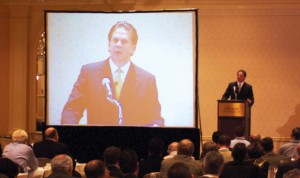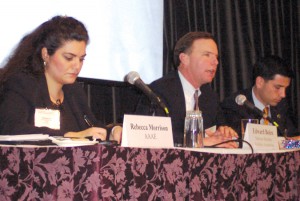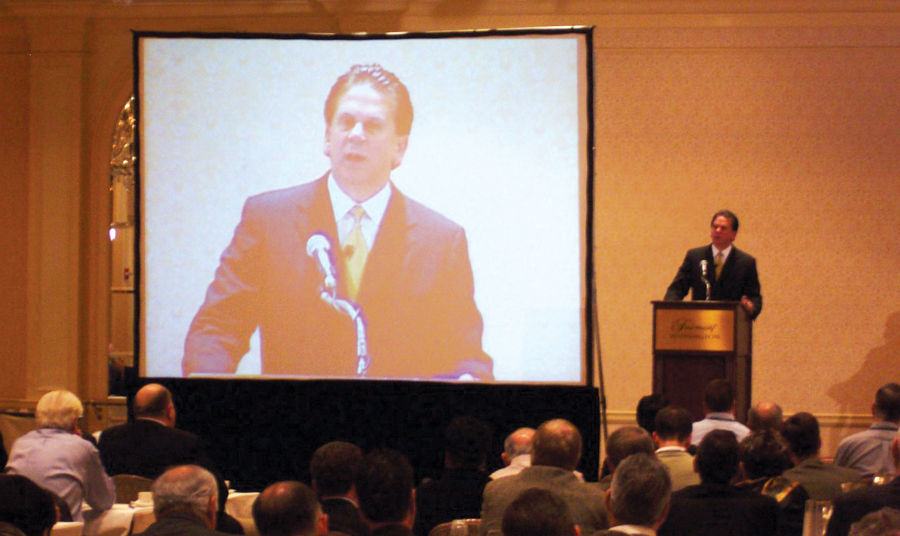By Jeff Price

David Stone, assistant secretary for Homeland Security, discusses what “keeps him up at night,” which is thin-sheet explosives smuggled through screening checkpoints on a person’s body.
Transportation officials gave a sneak preview of the changes coming to aviation security in 2005 at the Fourth Annual AAAE/TSA/DHS Aviation Security Summit, held December 13 in Washington D.C. The heaviest hitters in Homeland Security and the Transportation Security Administration headlined the joint summit between the American Association of Airport Executives and federal aviation security regulars.
In the leading man role was David Stone, former U.S. Navy Admiral and currently the assistant secretary of Homeland Security. Stone provided an overview of the various programs already underway and those yet to come. One program that has received a lot of attention is the increased scrutiny of passengers at the screening checkpoints.
When terrorists brought down two Russian Aeroflot flights in August 2004, it exposed yet another weakness in the aviation security system. Investigators believe the Russian bombers wore plastic explosives on their body, which enabled them to walk through metal detectors without setting off the alarms. The detectors are designed to find metal, not plastic explosives. In the U.S., the TSA responded by adding aggressive pat-down searches of travelers, which immediately led to numerous invasion-of-privacy complaints.
Travelers should get used to the intrusive searches. It was a major focus of the conference and according to Stone, the one thing that keeps him up at night.
“Thin-sheet explosives through the screening checkpoint are my greatest concern,” said Stone.
Also on hand was Jonathan Fleming, TSA’s COO, who stated that over the Thanksgiving holiday, over 2.6 million passengers were subject to the pat-downs. However, officials recorded only 133 complaints, many of them from travelers who didn’t know the program existed, and many others who complained that they were embarrassed because the search was done in public view. TSA is working on a public relations program to let more travelers know about the program and offers private screening locations for those passengers who request it. That still leaves a very small number of individuals who believe that touching during the pat-down, performed by a screener of the same sex, was inappropriate. TSA promises that each incident is investigated completely and appropriate action taken.
Tom Blank, TSA’s chief systems support officer, states that companies are already developing technologies to reduce the amount of pat downs. Three major technologies are in the works. The first is a document scanner that enables screeners to put travel documents, such as boarding passes or identification cards (passports, driver’s licenses, etc), through an explosives trace detector. Another technology is a walk-through particle sniffer that detects trace elements of explosives as an individual passes through a scanning area. The third technology, backscatter x-ray systems, is the most controversial.
Remember the old x-ray glasses from the comic book ads that never worked? Well, backscatter x-ray does work and is able to see thru an individual’s clothing without seeing through their skin. The resulting image is far from a Playboy centerfold, but is still very revealing. The technology is currently in use at Ben Gurion Airport in Tel Aviv, Israel, and is being tested at London/Heathrow Airport. However, privacy issues in the U.S. have prevented its implementation here—so far. Look for a few test programs to pop up at an airport near you.
Stone said he expects the Registered Traveler program to continue expanding in 2005. Presently, five airports and 10,000 travelers are participating in the program. Registered Traveler offers frequent flyers the opportunity to undergo background checks for the benefit of not having to go through the secondary screening process. Officials state there will never be a program that allows travelers to bypass the screening process completely, but that not having to go through random secondary screening processes allows frequent travelers to better predict the amount of time they spend in airport screening lines.
AAAE President Chip Barclay encouraged the TSA’s efforts with Registered Traveler as part of an overall strategy to focus more on bad people, rather than on bad things.
“In 9/11, people figured out a way to use our policies against us,” stated Barclay, referencing the hijackers’ knowledge of U.S. aviation hijack policy, which at the time called for cooperating with hijackers. That rationale was tossed aside by the passengers on United Flight 93, who stopped the terrorists from achieving their ultimate objective.
In another effort to identify bad people, Secure Flight, the resurrected passenger profiling program, is currently in the test phase, using 2004 traveler data. Secure Flight will compare passenger identification information against known terrorist watch lists and other law enforcement databases to either mandate secondary screening for some travelers or even prevent high-risk individuals from air travel completely. The original program, known as the Computer Assisted Passenger Profiling Systems II, was mandated by the Aviation and Transportation Security Act passed in November 2001, but was killed by privacy rights activists when they believed the program was exceeding its mandate. Secure Flight makes one significant change to the CAPPS II program by taking the responsibility of passenger vetting from the airlines and to the government.
If you work at a commercial service airport, TSA is still working towards some form of employee screening. Whether that screening will look like passenger screening is as yet undetermined, but any employee screening program will almost certainly include biometrics, according to TSA officials. TSA already has 1.3 million criminal history record checks on airport and airline employees and is currently in the process of conducting advanced records checks, which includes comparing employee names to terrorist watch lists and other law enforcement databases.
Air cargo security is becoming the subject of more scrutiny. The TSA published a set of proposed air cargo rules in early December that if passed will mandate security programs for all cargo operators and indirect air cargo operators (freight forwarders who transport cargo on board commercial airliners), and limited cargo screening.
Noticeably absent from this year’s conference was the topic of surface-to-air missile attacks, which according to some security officials, is still an area that hasn’t received enough attention. However, the 9/11 bill passed in December 2004 mandates ending the proliferation of the missiles and continued research and development into defenses against the threat.
The vendors were all present at the conference, rolling out the latest and greatest technology to detect, deter and prevent explosives and weapons from getting on board airplanes. However, nothing happens without funding, something that has been noticeably absent recently when it comes to federal cash for local airport security improvements. While the passage of the 9/11 bill does allocate mandatory spending for explosives detection technologies, airport officials leveled criticism at legislative representatives for not providing the necessary discretionary funding to meet other mandates.
Probably the most haunting statement came from former FAA Security Chief Cathal “Irish” Flynn (retired), who stated that he believes the nation has lost all sense of urgency when it comes to funding more aviation security improvements, “just like they did after the Pan Am (103) bombing.”
General aviation security was an area of focus this year. With new rules covering background checks for all flight training students debuting in October 2004, a recently released report by the General Accounting Office on GA security, and the creation of more risk assessment models from the TSA, seats were hard to find in the usually half-empty GA session.
The new flight training rules caught about 70,000 flight instructors, over 70 aviation colleges and thousands of flight schools nationwide completely by surprise. The rules require U.S. citizens taking flying lessons to verify their citizenship to their flight instructor (and school and college), and registered legal aliens must undergo fingerprint-based criminal history background checks. TSA came under blistering criticism for rolling out the program without prior notice and for only giving instructors and schools less than a month to implement the procedures. Only after overwhelming industry pressure did the TSA back off the deadlines, leaving some to question just how in touch TSA is with the GA community.
Chad Wolf, director of transportation security policy, stated that the alien flight training program was originally the responsibility of the Department of Justice. DOJ punted the program to Homeland Security in early 2004, forcing DHS to miss the February 2004 deadline to implement alien flight training checks. Wolf stated that the flight training rule was rolled out quickly in October in order to meet Congressional deadlines.
Although the question was asked, Wolf didn’t confirm whether TSA was working on any additional changes that would affect the flight training community.

Rebecca Morrison, AAAE’s staff vice president of transportation security policy; Ed Bolen, president of the National Business Aviation Association; and Chad Wolf, assistant administrator, TSA, address an audience of general aviation airport security manag
The GAO report encouraged TSA to develop more risk-based assessments for GA airports, which TSA is already in the process of doing. However, airport managers questioned whether the assessment process could be used against them in a court of law should something happen from their facility. Wolf reaffirmed that the assessments were recommendations, not mandates; however, several GA airport managers said they believe that TSA GA airport security mandates aren’t a matter of if, but when.
Ironically, TSA officials also stated that, unfortunately, the next terrorist attack is not a matter of if, but when. Hopefully, that will not be a part of the 2006 coming attractions.











